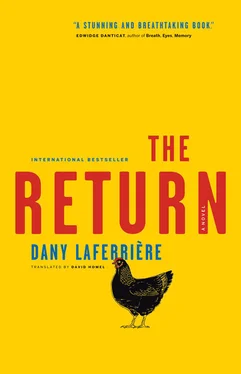Can anyone know what goes on in the head of a man who has lost his mind? I wish I’d inherited his ideas of social justice, his intransigence toward power, his disdain for money and his passion for other people. And what would your mother get? What she was always able to hold onto above and beyond her pain. Our eyes meet in silence. Then Aunt Ninine finally opens the door.
The Killer on the Motorbike
In the theater of Port-au-Prince
everything comes at you live.
Even death which can show up
at any moment
on a Kawasaki.
Death imported from Asia.
A young man in dark glasses
revving his little yellow Kawasaki
shows off on the square.
“A bad seed,” declares
the lady sitting next to me.
We find out later
that a young man on a motorbike,
without even stopping, shot at
two doctors
going into their clinic.
Right close by.
Death at top speed.
The witness (a man of about sixty): “I was right there, next to the doctors who were talking. I heard a motorbike. I turned around to see where it was coming from. Bang. Bang. Two shots. The two doctors fall. One’s shot in the throat, the other in the heart. He didn’t even stop.”
A crowd quickly gathers around the only witness to the two murders. The ambulance hurries to pick up the wounded. One is already dead. The other who was shot in the throat doesn’t stand much of a chance. His wife rushes up and starts talking about having him transferred to Miami by helicopter.
The same witness: “I admire people who are good at their job. He hardly slowed down at all. Such precision! Not everybody can do that, I mean, I rode a motorbike for ten years. It was a Kawasaki, a new model. Compact but reliable. Obviously if you’ve got a bike that breaks down, as often happens, then it’s more risky. You can see he takes his job seriously.”
A policeman comes up to him. The crowd parts in front of the man who is still admiring the killer’s precision work.
Policeman: You’re coming with me.
Witness: Why?
Policeman: You seem to know what’s going on here. I think you’re going to be able to help us.
Witness: I happen to live around here. . I’m just a motorbike fan.
Lady: Maybe he likes motorbikes but he doesn’t live around here. I’ve been in this neighborhood for forty-six years and it’s the first time I’ve seen him.
Policeman: You’re going to come with me.
Witness: I live in Jalousie, just up the mountain.
Lady: All the hoodlums who terrorize us live up there.
Witness: I’m not an accomplice. . I simply appreciate a job well done.
Policeman: Come with me or I’ll put the handcuffs on you.
Witness: This is a democracy…
Other Lady: Maybe he’s telling the truth, maybe he just likes motorbikes. . Some people don’t know when to keep their mouths shut. When faced with death, we must simply bow our heads.
Policeman: Come with me. And you, Madame, you’re a witness too?
First Lady: No, I was eating when it happened.
Policeman: All right, break it up, move on, everybody…
When everyone
runs every which way through the market
it means there’s someone
for whom time has stopped.
Lying on the ground in his own blood.
The last spasms of life.
The sound of a motorbike speeding off.
The young guy on the bike got away easily.
But they’ll catch up to him soon enough.
The slum where he lives is crawling with
police informants
most of whom are killers too.
According to a New York Times investigation most of the murders are ordered by powerful businessmen who live in the luxury villas high on the mountain slope. Right across from the slums where the killers live.
The contracts are negotiated by cell phone, from one ghetto to the other. The starving masses and the upper classes have always been interested in technological progress. The latter for security reasons. The former to remain in the battle.
Since I’m here I take a look around. I like to scout out the locations and know where I am, to avoid ending up in a blind alley if ever I have to run. I come across a little park filled with former students who can’t find work. Those who haven’t yet understood that only ten percent will get a decent job when they get out of school. And that their studies aren’t enough. To work in this country, a bitter but lucid student told me, you have to come from a good background or ally yourself with a powerful political family.
The unemployed lying on park benches
with white handkerchiefs over their faces.
A few prostitutes in miniskirts
trying to pass themselves off
as modern literature students.
A dozing policeman,
his gun and nothing else between his legs.
Rest for the wretched.
A girl accompanies her mother
who is herself so young she could
be her older sister.
They accost me quickly
to inquire after my desires.
They say that a mother and daughter in the same bed
can still excite an old senator.
I’m not there yet.
They go off with their arms around each other’s waist.
From behind, I can’t distinguish the mother from the daughter.
The young man sitting next to me watches the van full of police from the international squad go by. The more cops there are, the more thieves. What do you mean? I ask. They’re all the same. I don’t get it. The ones who are supposed to be protecting us are in business with the killers when they’re not killers them-selves. How do you defend yourself? We walk in the shadows and stay at home as much as we can. I’m telling you only a dictator can save this country. How old are you? Twenty-three. I bet you never knew the dictator. No, but I’m telling you all the same: this country needs a leader, otherwise it’s total disorder. And where is the chaos? He gives me a stunned look. I see order everywhere. The powerful keep everything for themselves. Since the little guys have nothing, they tear each other apart for the few crumbs that are left. If we name a dictator, we’ll simply make the way things are official. I still believe we need a leader in this country. These days, every neighborhood is controlled by armed gangs that constantly fight each other and terrorize everyone else in the process.
We take a few steps into the park. What are you studying? Political science. And you want a dictator? Yes, sir, anything but this untenable situation. We could always protest against the dictator on the international scene or even try to topple him. The one I knew, if you add the father’s regime to the son’s, ran from 1957 to 1986, twenty-nine years. What you’re seeing now is their legacy. A dictator would only give them legitimacy. And order serves only to enrich one particular group. Disorder begins when other groups start demanding their share. You don’t live here? I came from Montreal. And there’s no dictator there if I understand correctly. No, but there’s winter. It’s not the same thing. Of course not, I was joking. His face darkens. Is the winter so terrible up there? You have to go through it to understand. So it’s subjective then? More like democratic. Everybody suffers. Not everybody: those who can get away, do. It’s like here: people who have the means don’t have to suffer the rigors of dictatorship. I’d like to go up there and see one day. You don’t just go and see. You go for a while and end up spending your life there.
I leave him, hoping he won’t end up like the people he is denouncing. Still, he’s got the right profile. The feeling of being looked down on by a certain class, the enormous financial difficulties that keep him from satisfying his most primal needs, and to that you have to add an immoderate taste for flowery language and the loneliness (sexual hunger is part of it) of someone who was orphaned at an early age. Not so different from the young François Duvalier when he wrote his poem “Les Sanglots d’un exilé” whose main theme is the resentment that would later serve as his political platform.
Читать дальше












